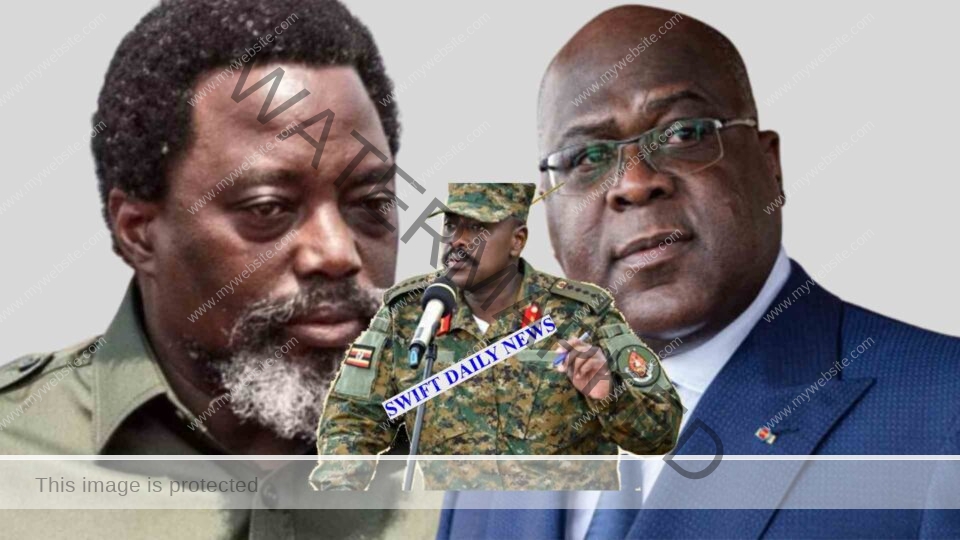By Our Reporter
General Muhoozi Kainerugaba has pledged support for Democratic Republic of Congo (DRC) President Felix Tshisekedi and warning against the return of former President Joseph Kabila.
In a series of pointed comments, Muhoozi said: “My big brother, H.E. Felix Tshisekedi, is President of DRC and I will support him as much as possible.”
He further criticized Kabila’s past leadership, particularly regarding security issues in Eastern Congo:
“Kabila allowed ADF to subsist in Eastern DRC for 17 years. He never allowed us to take action against them. H.E. Tshisekedi is much better than him in that respect.”
Muhoozi concluded with a firm warning against Kabila’s potential political comeback:
“I will not let Joseph Kabila become a President of DRC again! You can forget about that.”
Muhoozi’s public endorsement of Tshisekedi and criticism of Kabila comes at a sensitive time for both Uganda and the DRC, countries that have historically collaborated — particularly on joint military operations against rebel groups like the Allied Democratic Forces (ADF) — while also navigating occasional diplomatic tensions.
Joseph Kabila ruled the DRC from 2001 until 2019. Despite stepping down, he remains a significant political figure behind the scenes, and there have been persistent reports suggesting he may seek a return to power in future elections.
Mushrooming Rebel Groups During Kabila’s Leadership
Joseph Kabila’s rise to power in 2001 marked a turning point in the Democratic Republic of Congo (DRC), but also ushered in an era where rebel activity became deeply entrenched in the country’s eastern regions. After the assassination of his father, Laurent-Désiré Kabila, Joseph inherited a nation already fractured by internal conflicts and foreign interventions. Despite initial hopes for stability, his presidency struggled to tame the widespread insecurity, particularly in provinces like North Kivu and Ituri, where armed groups flourished.
Throughout Kabila’s nearly two-decade rule, the eastern DRC remained a hotspot for rebel insurgencies. Groups such as the Allied Democratic Forces (ADF), the Democratic Forces for the Liberation of Rwanda (FDLR), and countless local militias exploited the weak state presence to consolidate their control over vast territories. Often operating with impunity, these rebels engaged in brutal tactics, including massacres, mass displacement of civilians, and illicit exploitation of natural resources, especially gold and coltan. Despite repeated promises from Kabila’s government to disarm these groups, large-scale military campaigns yielded limited results.
Critics accused Kabila’s administration of complacency, corruption, and even tacit alliances with certain militias. Many reports suggested that elements within the Congolese army (FARDC) either collaborated with or turned a blind eye to rebel activities in exchange for a share of the profits from the region’s lucrative mining industry. This environment of lawlessness severely undermined trust in Kabila’s leadership, both domestically and internationally, with the United Nations consistently highlighting the DRC as one of the world’s most persistent humanitarian crises.
Under Kabila, peace agreements often failed to deliver long-term stability because they rarely addressed the root causes of conflict — governance failures, ethnic tensions, and competition over resources. Instead, rebel leaders were sometimes co-opted into the army without proper vetting, allowing abuses to continue from within official structures. Furthermore, limited investment in infrastructure and public services left local populations vulnerable to the influence of armed groups, who sometimes provided basic security in the absence of the state.
By the time Kabila stepped down in 2019, the DRC had more than 120 armed groups operating in its eastern territories — a staggering legacy of unresolved conflict. Although his successor, President Félix Tshisekedi, pledged to dismantle these networks, the scale and depth of the problem remain immense. Many analysts argue that Kabila’s failure to build strong institutions, enforce the rule of law, and prioritize peace-building over political survival created conditions that continue to destabilize the DRC to this day.
Have An Advert Or Article You Want Us To Publish? Email: swiftnewsug@gmail.com


